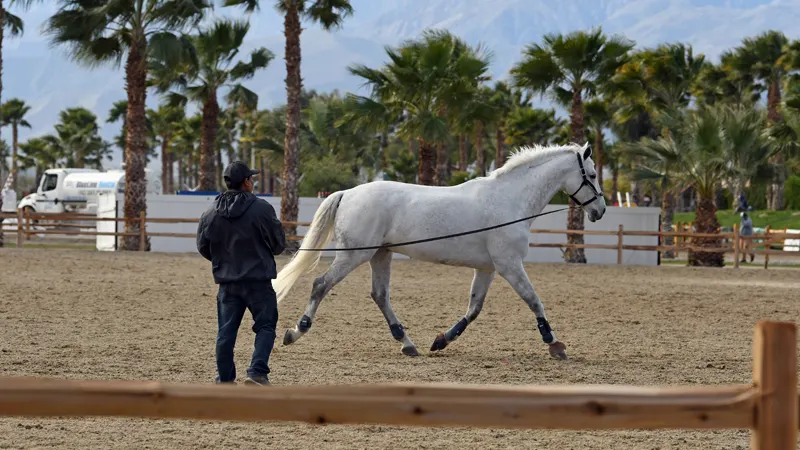U.S. Hunter Jumper Association President Mary Knowlton opened up the latest USHJA Town Hall webinar Monday by announcing that it was open mic night, where participants could pick the topics they want to discuss, and the 90 people on the Zoom call took that to heart.
Members discussed a number of topics, including the price of horse showing, the role of stewards, limiting the number of classes a horse can enter, and longeing concerns, but one of the biggest discussions was about improving judging.
Virginia-based professional Randee Beckman expressed frustration with seeing horses with mistakes pinned above better rounds.
“When questioned (going through the steward, of course) the judge’s response was, ‘I must have missed that. I must have missed that,’ over and over,” she wrote in the Q&A. “Please assign scribes like the dressage shows do.”
Knowlton agreed that scribes were “worthy of discussion” but noted some of the challenges of using them: Adding scribes means adding an expense that would be passed on to the exhibitor—dressage scribes are generally volunteers—and scribes, who would have to be well-trained, would add to the challenge of keeping confidentiality about the conversations in the judges box—not a problem with dressage as there is open movement-by-movement scoring there. Some suggested that learner judges could work as scribes.

But others, like R-rated judge Lucie McKinney, disagreed with the concept in practice.
“There’s no way a scribe works,” said McKinney, Cape Coral, Florida. “If I’ve got 25 in a class, and I haven’t written everything down on my card, I can’t watch horse No. 18 and decide if he fits before the horse who went second or sixth. If I have to look at my scribe to find out if that’s going to work; it makes no sense. The cost alone is counterproductive.”
McKinney and others said a better solution would be having two judges at bigger shows that both judged each class together. Although that does happen already, she said, often when two judges are assigned to sit together they take turns judging each round, which doesn’t help the problem of missing something in the ring.
ADVERTISEMENT
Knowlton dubbed an additional aspect of judging, comparative versus standardized judging, a “big discussion.” Dressage, for example, uses standardized judging with assigned deductions for mistakes. Hunters have traditionally used comparative judging, where the first horse is used as a benchmark, and everything else is either better or worse than that round. Even when numerical scoring is used in the hunters, it’s not a standardized aside from a few conventions, such as assigning as mark of 45 to a round with a rail.
“[In dressage] an 8—which would be like an 80 for us I suppose—is an 8 is an 8,” Knowlton said. “For us an 80 isn’t an 80.”
A few, like California trainer Jim Hagman, said they supported swapping to standardized scoring. Knowlton asked McKinney what she thought of standardizing scoring, and she said she hates it.
“I won’t judge at NCEA shows, because of how they do that to a standard: after each movement a point, after each jump the scribes writes a score so you have an overall [total],” she said. “I want to compare from when they entered the ring to when they left the ring to the next person.”
Improving Horse Welfare
Many governance discussions over the past year have focused on social license to operate, the concept that that equestrian sports—and the use of horses within them—need the approval of the larger society to continue. This lends urgency to the idea that horse sports should get their own houses in order so that an outside force, such as government, doesn’t impose regulations upon them.
“[Everyone is] one cell phone video or picture away from being internet famous—and not in a good way,” Knowlton said. “How can we as a sport pull ourselves up? How do we stop over-longeing of horses and incorrect longeing of horses? By that I mean horses on two leads, spinning in small circles, people over-chasing horses, [also] people over-showing horses, showing them in 12 classes a day, or whatever number is incorrect for you.”

One idea for improving longing welfare came from Pennsylvania-based steward Faith McKay-Alicea.
ADVERTISEMENT
“Last time that we did Brandywine [Horse Show (Pennsylvania)], we had a very good system for longeing,” she said. “We allowed, because there was limited space, 15 minutes. I was in charge of it. At 7 minutes and 30 seconds, we would tell them that they’re halfway, then after they completed their 15 minutes they were able to get back in line if they would like, but we had a 15-minute cap on longeing just because of the location, which was [the Devon show grounds]. But I think it is manageable that you could have a longeing steward out there working with management and setting the parameters of what that would look like and the expectations.”
Many suggested longeing supervisors, which are used at shows such as the Hampton Classic (New York) to keep an eye on that area. California-based judge and steward Sharon Stewart-Wells noted that longeing takes place early in the morning in multiple areas at many horse shows, increasing the challenge of monitoring it. Others pointed to a rule change proposal approved by the USHJA, which will be voted on by the U.S. Equestrian Federation next week, requiring horses to wear their numbers while being longed to make it easier for stewards to keep an eye on longeing areas.
Several participants chimed in with stories about horses showing in dozens of classes during one show, and asked what can be done to prevent that. Knowlton asked if it mattered what the classes were: Would 12 crossrail rounds be acceptable, versus 12 rounds over 3’6” jumps? Should total number of classes per horse show be considered, or total number of classes per day? When one anonymous attendee asked for the association to step in to regulate it, Knowlton pressed for specifics.
“[T]hey always say, ‘How do you know pornography? Well when you see it, you’ll know it.’ Well unfortunately with some of the issues in our sport, when we see it we’re not sure that we do know it.”
Mary Knowlton, USHJA President
“How many [classes] is that? What does that look like for you?” she said. “All of these things start with a discussion, then go to a rule change with more discussion.”
R-rated hunter judge Missy Roades pointed out that some state associations limit each horse to seven jumping classes a day, and an anonymous attendee said they’ve signed leases that limit a horse to three jumping classes a day and eight total at a show. Atlanta-based steward Mary Beebee asked to get data on how many classes horses were competing in at each show to better inform a discussion on the appropriate number.
When an anonymous attendee referred to the number of warm-up jumps some exhibitors were taking prior to even showing, Knowlton acknowledged a step that doesn’t require additional regulation.
“I think education, education, education,” she said. “And it’s education of not just trainers but our customers, our juniors, our amateurs, our parents. I think all of those things are incredibly important. Unfortunately they always say, ‘How do you know pornography? Well when you see it, you’ll know it.’ Well unfortunately with some of the issues in our sport, when we see it we’re not sure that we do know it.”
The final in the current four-meeting series of USHJA Town Halls will be held at 7 p.m. Eastern Time July 24. Each Town Hall is open to members and non-members and will include an open question-and-answer period. Individuals are encouraged to come with thoughts and opinions and may submit questions, comments or feedback in advance of a Town Hall to feedback@ushja.org. Register to participate here.














